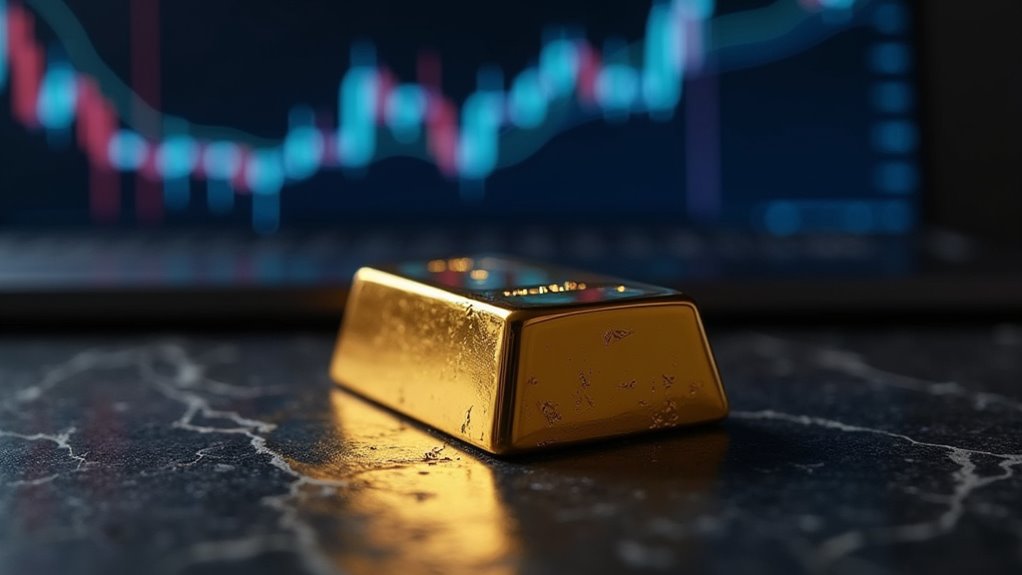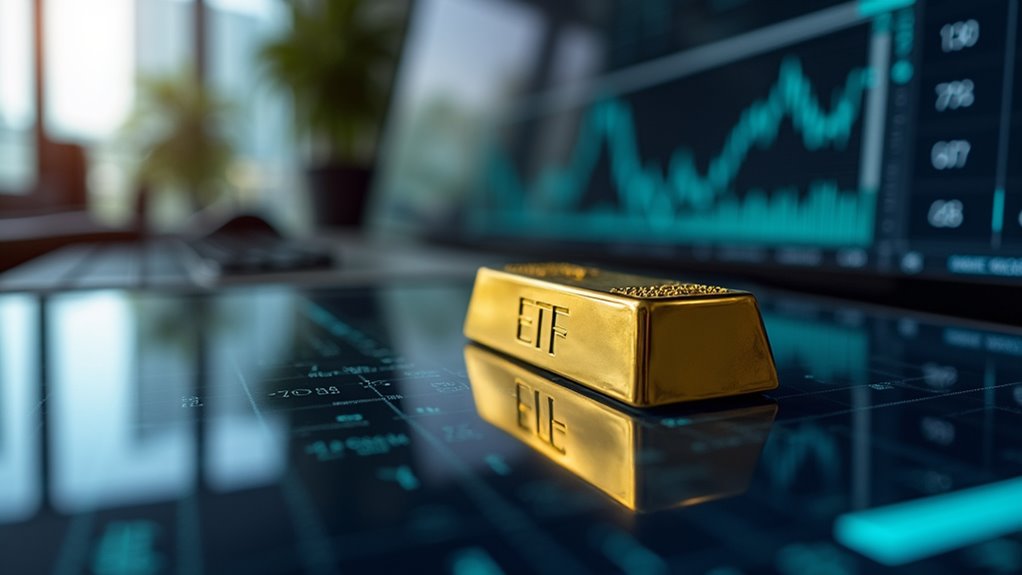Digital gold trading offers distinct advantages over physical coins through enhanced accessibility, lower costs, and superior liquidity. While physical gold appeals to collectors and traditional investors, digital platforms enable instant transactions, fractional purchases, and secure storage without additional fees beyond GST. Digital assets provide real-time tracking and encrypted security, whereas physical coins require secure storage solutions and face potential theft risks. The evolving market landscape reveals compelling reasons to contemplate both investment approaches.

Increasingly, investors find themselves at a crossroads when choosing between traditional physical gold coins and modern digital gold assets. The evolution of gold investment has brought forth distinctive advantages and considerations for each approach, fundamentally changing how people engage with this precious metal.
The accessibility of digital gold platforms has revolutionised the investment landscape, offering unprecedented convenience through online transactions that can be executed anytime, anywhere. Unlike physical gold coins, which require visits to dealers or banks, digital platforms enable instant purchases through mobile apps and websites. This accessibility extends to investment amounts, with digital gold allowing fractional purchases starting from just 1 gram, making it more attainable for diverse investment portfolios. Furthermore, the diversity of gold investment options has expanded significantly, catering to varying investor preferences. Additionally, the growing popularity of digital gold reflects a shift in market conditions favoring modern investment strategies. Investments in digital gold can also benefit from increased market efficiency, as they can respond more quickly to price fluctuations than physical assets. As a result, digital assets are appealing for investing in gold for beginners, enabling newcomers to enter the market with less capital.
Digital gold brings investing to your fingertips, transforming how we buy precious metals through instant, accessible transactions for investors of all levels.
Cost considerations play a pivotal role in the investment decision. Physical gold coins often come with substantial overhead costs, including dealer premiums and secure storage requirements. Digital gold, meanwhile, typically involves lower transaction fees, primarily consisting of a 3% GST, without the burden of additional making charges or storage expenses. The elimination of physical storage costs represents a considerable advantage, as providers manage the vaulting and insurance responsibilities.
Security emerges as a critical factor in the comparison. Physical gold coins face inherent risks of theft, loss, or damage, necessitating secure storage solutions that often incur additional expenses. Digital gold platforms implement robust security measures, including encryption and insured vaulting facilities, providing investors with peace of mind regarding their holdings. The transparency of digital platforms also enables real-time tracking and verification of investments.
The liquidity profile differs greatly between the two options. Digital gold offers superior flexibility, allowing investors to sell precise quantities instantly, even during emergencies. Conversely, physical gold coins may face challenges in quick liquidation, often requiring assessment procedures and potentially unfavourable local market conditions. The ability to place market orders at preferred prices through digital platforms enhances the efficiency of price-driven transactions.
Investment strategies also influence the choice between physical and digital gold. While physical gold coins often appeal to collectors and those seeking tangible assets for long-term holding or cultural significance, digital gold caters to more dynamic investment approaches. The latter’s flexibility in scaling positions and executing rapid transactions makes it particularly suitable for active portfolio management. Additionally, investing in gold can serve as a hedge against inflation, providing stability in uncertain economic times.
Despite occasional technological glitches in digital platforms, the trend towards digital gold investment continues to grow. However, physical gold coins maintain their appeal for traditionalists and those valuing the tactile nature of their investments. The choice ultimately depends on individual investment objectives, risk tolerance, and preference for either the historical tangibility of physical gold or the modern efficiency of digital alternatives.
Frequently Asked Questions
How Can I Verify the Authenticity of Physical Gold Coins?
Authenticating gold coins involves several reliable testing methods.
Visual inspection under magnification reveals hallmarks and potential imperfections, while precise weight measurements can identify counterfeits.
Physical tests, such as the magnet and ceramic scratch tests, offer quick verification.
Professional certification and acid testing provide definitive proof of authenticity.
It’s advisable to combine multiple methods and seek expert assessment for valuable pieces.
What Happens to My Digital Gold Assets During a Complete Internet Outage?
During a complete internet outage, digital gold assets become temporarily inaccessible.
Owners cannot execute trades, verify ownership or access their digital wallets until connectivity is restored.
The assets themselves remain secure on the blockchain, but transactions freeze completely.
This highlights a key vulnerability of digital gold investments – their total dependence on functioning internet infrastructure.
Recovery timelines depend entirely on when internet service resumes.
Are There Storage Fees Associated With Digital Gold Investments?
Digital gold investments typically involve storage fees, which vary among providers.
Most platforms charge annual fees ranging from 0.3% to 0.5% of the asset’s value, plus applicable taxes like GST or VAT. These fees are usually calculated based on daily market values and billed quarterly.
Some providers, like SafeGold, offer fee-free periods for up to five years.
However, it’s essential for investors to carefully review fee structures before committing to a platform.
Can I Convert My Digital Gold to Physical Gold Instantly?
Instant conversion of digital gold to physical gold is generally not possible due to logistical requirements.
The process typically takes 7-15 business days, involving submission of delivery instruction slips and surrender request forms through authorised depositories.
While some providers offer expedited services, mandatory verification procedures and administrative processes must still be completed.
Customers should anticipate standard processing times and associated fees, including administrative charges and applicable taxes.
Which Option Offers Better Protection Against Government Confiscation?
Digital assets generally offer stronger protection against government confiscation compared to physical gold.
While both carry risks, digital assets‘ decentralised nature and non-custodial storage options make them harder to seize than tangible gold coins.
Privacy-focused cryptocurrencies provide additional anonymity features, whereas physical gold is more vulnerable to direct confiscation, as demonstrated by historical precedents like the 1933 U.S. Gold Confiscation Act.
However, both remain subject to regulatory oversight and potential restrictions.













